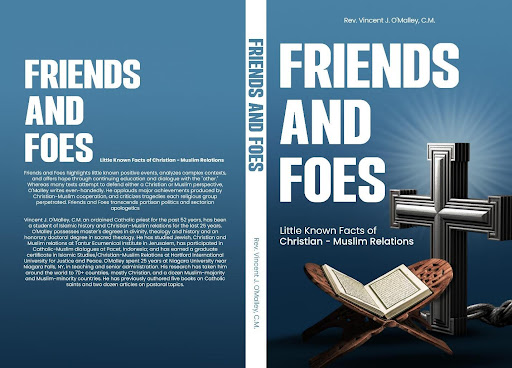Look around. From war-torn headlines to quiet neighborhood tensions, the divide between religious communities feels stubborn and familiar.
Suspicion travels faster than truth. Fear often speaks louder than faith. But what if we’ve been telling ourselves only half the story? And what if the real path to peace starts not with future policies but with past memories?
History is not just a record of wounds. It is also a record of healing. In Friends and Foes, Vincent J. O’Malley takes us through centuries of Christian-Muslim relations not to stir blame, but to recover what was lost: the memory of shared dignity, mutual respect, and moments of rare human courage that bridged worlds.
Forgotten Bridges
For years we have been taught religious history as a series of battles. The Crusades, the Reconquista, and the rise of empires loom large. But behind those headlines are quieter moments of grace.
Take the Abyssinian Migration. When early Muslims were hunted in Mecca, they fled to a Christian kingdom. The Christian king listened to their pleas and protected them, even when pressured to send them back. That decision came not from political convenience but from moral clarity.
Centuries later, scholars from both faiths would work together in medieval Spain, translating Greek philosophy, studying medicine, and developing ideas that would shape European thought. These weren’t isolated events. There were signs that cooperation is not the exception, but part of our shared tradition.
History Without Blame
Healing divides does not mean rewriting the past. It means seeing it fully. O’Malley is honest about the violence, persecution, and mutual suspicion that have also defined Christian-Muslim relations. But he does not stop there. He insists that we do not let our worst moments drown out our best.
True reconciliation comes from humility. From the willingness to say, we were wrong, and also, we were right. We have failed, and we have also loved. That balance is what makes history a tool for healing, rather than a weapon.
The Power of Memory
The stories we choose to remember shape how we see each other today. When we only remember conflict, we prepare ourselves for more of it. When we remember hospitality, dialogue, and shared wonder, we begin to open space for something new.
History can give us models of courage—ordinary men and women, leaders and scholars, saints and strangers—who dared to listen when it was easier to remain silent. They crossed borders not only of geography but of culture, language, and fear. They held onto faith without weaponizing it, choosing conviction without hostility, belief without domination.
Their examples remind us that difference does not have to mean division; it can be an invitation to curiosity, dialogue, and mutual growth. These stories teach us that courage is not always found in victory on the battlefield, but often in the quiet decision to extend trust, to protect the vulnerable, and to seek dignity for the other.
A Shared Future
So, can history help us heal religious divides? If we let it, yes. But only if we tell the whole story. Only if we allow ourselves to be challenged by the past, not just comforted by it.
Friends and Foes shows that Christianity and Islam have been more than opponents. They have been partners in survival, in learning, and in hope. That may not be the history we were taught. But it might be the one we need most right now.



